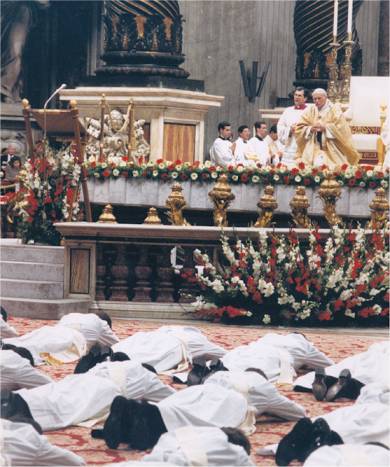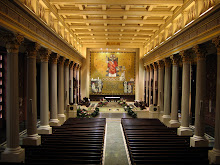Delievered at St. Mary's of the Woods, Russell's Point, Archdiocese of Cincinnati.
On Christmas, it is easy to focus on the Manger scene, after all, I think it is one of the most tender images we have in Christendom: The Child, Mary, Joseph and the shepherds in a peaceful scene, snow falling (at least in my image); it all adds up for a heart warming image.
Yet, I would like to focus this year not on the ‘how’ of Jesus’ coming, but more the ‘why.’ What we recognize, and where the readings all point, is that all of history was leading up to this point. But why did it have to happen?
Since Adam and Eve, a gulf had existed between God and humanity, which the whole of salvation history had as the goal of overcoming. The Covenant of Abraham, the Law through Moses, the leadership of the Judges and Kings, and the call to repentance of the Prophets all had the goal of restoring the relationship broken with Original Sin, yet it never worked. The chasm was too great, it could not be overcome by ‘normal means.’
Why not? Why could we not overcome it on our own? Obviously, sin blocks the path. The distortions from sin do not allow us to see straight, as God would like us to do. This sin is not just the original sin, but also our own participation through personal sin. Here, we follow the sins of our ancestors, mostly in falling to Pride. It seems to me that in the Old Testament, God was always approached through pride, out of a quest for vainglory and power. He responded: the GloryCloud was God intervening directly in history, but through ways that the people of the time expected.
This pride and desire for vainglory also formed the expectation for the Messiah, for He would come to reestablish Israel as an independent country, the country which the rest of the world would serve.
Into the midst of this expectation, Jesus comes in a manger. The Messiah, the savior of the world, is not born in a palace with kings and queens present to worship and adore. Rather, he comes in a manger, in a small town, with only an ox and a donkey to greet him.
This becomes the key to His mission: not power, but HUMILITY.
The Second Reading for the Mass during the Day, from the Letter to the Hebrews, reflects on this reality. The Divine Second Person of the Trinity, He who is the Word Made Flesh, the one who ordered all of creation, does not come in that power, but leaves it all behind to come as a child. He freely lays that aside to become a man like us in all things but sin.
Only in Christianity is there such a mystery, would such a statement ever be echoed: ‘God so loved the world that He sent His Only Begotten Son to be our Savior.’ In Judaism and Islam, God is master, we are servants. In Eastern Religions, Nirvana is emptiness, not union with the Divine. In the Greco-Roman Pagan religions, you really just hoped the gods left you alone.
Yet, in Christianity, we see that God so desires for us to be reunited with Himself that He comes down to earth so that He might lift us back, not just to an earthly paradise, but a heavenly one.
What we must learn, however, is that how God deals with us, we must pay back to God. This is the flip of the approach between the Old Testament and the New.
No longer do we approach God in fear and trembling (although that should be a part of our approach), in the New, we come in humility and emptiness, offering our gifts to God to use as He will.
Hence, as we gather on these Christmas days, sharing gifts with one another as expressions of love for one another, let us also recognize those gifts that God has given, those unique talents and abilities that are personal to each one of us.
Not just to focus on those gifts, but to also recognize how God is asking us to share those gifts with our families, the Church, and the world.
Then, Christ will be revealed not just as a small child on Christmas day, but every thought, word and deed uttered by those who claim the name Christian will continue to bear Christ to the world.
Then, we will echo John the Baptist: He must increase, I must decrease.
Then, we will have a place not just here, but in that Heavenly Paradise He came to establish.
Subscribe to:
Post Comments (Atom)










No comments:
Post a Comment